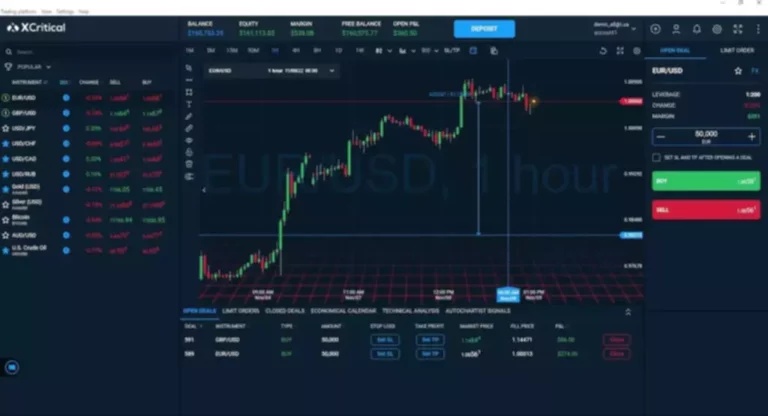
Menu
Content
Critics of PFOF argue that this is a conflict of interest because the broker's profit motive might override the duty to provide the best-executed trades for clients. The additional order flow that market makers receive from brokers can help them manage their inventory and balance their risk. Hence, they pay https://www.xcritical.com/ brokers for orders because they mean a steady stream of trades, which can be crucial for having enough securities to act as market makers and for profitability. Payment for order flow (PFOF) are fees that broker-dealers receive for placing trades with market makers and electronic communication networks, who then execute the trades. The results are striking because both TD Ameritrade and Robinhood use the same wholesalers. Examining differences in the PFOF received from a given wholesaler, the lack of PI at Robinhood is explained by the amount of PFOF received.
It might be a penny (or even a fraction of a penny) per share, but improvement is improvement. Because retail order flow is seen as the bread and butter of the market maker’s operation, it’s in pfof meaning the market maker’s best interest to attract that order flow. Hence the compensation or “payment” they may offer to brokers for that order flow. A market maker is an individual or financial firm committed to making sure there are securities to trade in the market. Market makers are essential to maintaining an efficient market in which investors' orders can be filled (otherwise known as liquidity).

Payment for order flow has evolved greatly, to the benefit of the retail stock and option trader—at least, in terms of reduced commissions. Because of the controversy, the European Union has decided to ban payment for order flow from 2026 onwards. Until then, member states can allow PFOF but only for clients in that member state. So Trade Republic can earn money through PFOF for its German clients until 2026, but not for its Belgian clients for instance.

Regardless, this is still an astounding change over the same period in which low- or no-commission brokerages came on the scene. Just before the pandemic, about a third of the equity options trading volume was from retail investors. But this explosive growth came on the heels of a major rise in options trading in the 2010s, with more than tenfold as many equity options coming from retail investors in 2020 than in 2010. Payment for order flow (PFOF) is a form of compensation, usually in fractions of a penny per share, that a brokerage firm receives for directing orders and executing trades to a particular market maker or exchange. Not meeting those two criteria is how Robinhood wound up squarely in the sights of the SEC.

It takes a level of responsibility off of the retail customer, allowing them to learn as they go and make decisions based on the stock markets performance, not broker fees. The lowering of fees has been a boon to the industry, vastly expanding access to retail traders who now pay less than they would have previously. However, these benefits would disappear any time the PFOF costs customers more through inferior execution than they saved in commissions. Regulation NMS requires brokers to disclose their policies on PFOF and their financial relationships with market makers to investors. Your brokerage firm should inform you when you first open your account, and then update you annually about what it receives for sending your orders to specific parties.
Every stock option has a strike price, the price at which the investor can exercise the contract, and an expiration date — the day on which the contract expires. In addition, FINRA issued a regulatory notice in 2015 reiterating the requirement for best execution in the face of increasing advances in technology, including PFOF. And both the SEC and FINRA have prosecuted firms for alleged best execution violations where the firm received PFOF. The UK, EU, and Canada have already banned PFOF, with Australia enacting temporary prohibitions while authorities consider a total ban. So while CMS brokers and financial firms in Singapore, the UK, EU, Canada, and Australia may be affected right now, the observed shift towards the prohibition of payment for order flow may include more jurisdictions in the future.
Based on data from SEC Rule 606 reports, researchers in the 2022 study mentioned above calculated that the typical PFOF paid to a broker for routing options is far more than for stocks. The purpose of allowing PFOF transactions is liquidity, ensuring there are plenty of assets on the market to trade, not to profit by giving clients inferior prices. The EU moved last year to phase out the practice by 2026, and calls for the SEC to do the same have led only to proposals to restrict and provide greater transparency to the process, not ban it altogether.
This transition caused a steady increase in off-exchange trading from 11% in 2004 to 40% in 2022 as major wholesale vendors paying for the order flow routed the trades through dark pools or internalised them against their own book. Advocates argue that freedom from some of the rules governing exchanges means that they are often able to get clients a better price. The critics aren’t convinced and point to the clear lack of competition amongst the dominant players, with one wholesaler in particular, handling 25% of US equity transactions.
Understanding the scope and implications of payment for order flow regulations is essential for Canadian investors managing cross-border investments. Its when a broker-dealer is paid by a market maker to route orders to the market maker. But for most of the top retail brokers in the U.S., another revenue source is payment for order flow (PFOF). There's also a concern about transparency and whether investors fully understand how their trades are being handled. The standards for what a broker must do for their clients would ratchet up.
While electronic trading has substantially narrowed bid-ask spreads in recent years, said Atkin, many of the most actively traded stocks have large spreads. That gap gives the market makers latitude in choosing prices at which to buy and sell. The SEC National Best Bid and Offer (NBBO) rule only requires market makers to match the best posted prices, which therefore gives them rich opportunities. Market makers do an extremely large number of trades in-house by matching buyers and sellers or taking the other side of the customer’s trade.
In March 2021, FINRA published a regulatory notice reminding firms of their order handling and best execution obligations during extreme market conditions. Conflicts of interest in financial firms can happen for a range of reasons. While regulatory requirements from authorities across the globe set out clear rules and guidance, many firms have found themselves inadequately equipped on examination.
Your firm’s technology must be capable of proactively flagging potential conflicts and suspicious activity to compliance teams. It must also quickly and effectively produce reporting and documentation that confirms or disproves any assumptions of wrongdoing, particularly upon request by regulators. Some retail brokerages that target more informed investors do not engage in PFOF.
The Motley Fool reaches millions of people every month through our premium investing solutions, free guidance and market analysis on Fool.com, personal finance education, top-rated podcasts, and non-profit The Motley Fool Foundation. Alpha.Alpha is an experiment brought to you by Public Holdings, Inc. (“Public”). Alpha is an AI research tool powered by GPT-4, a generative large language model. Alpha is experimental technology and may give inaccurate or inappropriate responses. Output from Alpha should not be construed as investment research or recommendations, and should not serve as the basis for any investment decision. All Alpha output is provided “as is.” Public makes no representations or warranties with respect to the accuracy, completeness, quality, timeliness, or any other characteristic of such output.
Essentially, market makers pay brokers a small fee for directing investor orders their way. This influx of trades increases their order book depth, potentially allowing them to widen the bid-ask spread — which translates to higher profits. A common contention about PFOF is that a brokerage might be routing orders to a particular market maker for its own benefit, not the investor’s. Investors who trade infrequently or in very small quantities might not feel the direct effects of their brokers’ PFOF practices, although it might have wider effects on the supply and demand in the stock market as a whole.